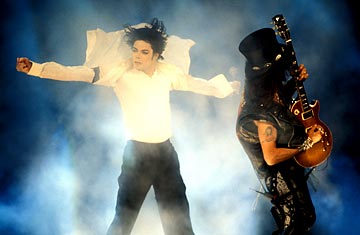
Michael Jackson performs with Slash during the MTV Video Music Awards at Radio City Music Hall
For black American men of a certain generation — my generation — the death of Michael Jackson is a particularly heavy loss.
One of my best memories of MJ is from my seventh birthday party, in September 1984. The period was, in many ways, a high point for black people in American pop culture: Jackson was at his professional peak, and The Cosby Show was just about to debut, giving the country and, eventually, the world, the first true lesson in what it means to be black and middle class. At my party, in my grandmother's New Orleans backyard, MJ's then mocha-toned face was everywhere: on the balloons, the napkins, the paper plates. Even the cake was shaped like MJ's head, with black jheri curls. Some of the best gifts I received were leather jackets — one black, the other red — splattered with shiny, silver buttons and zippers. (No glove.) My mom and dad also gave me every single, on vinyl, that MJ had ever recorded solo. I couldn't wait to go back to my room and bump to "Don't Stop 'Til You Get Enough" from my little record player. Or for the weather in New Orleans to turn cool, so I could finally wear one of my jackets.
I wasn't the only black kid who wanted to grow up to be MJ — or had parents who wanted the same thing. I didn't care about the ridicule that might have come from those who'd already dismissed Michael as not black enough, even though, at 7, I was already wrestling with my racial identity. Within a year, most of the record collection had been scratched from overuse or lost. In hindsight, it was far too precious a gift for a 7-year-old. I cringe at the thought of how valuable they might be today.
As I matured, I remained an MJ loyalist, even as he embarked on his often startling evolution: the skin-lightening, the child-molestation charges, the marriage to Lisa Marie Presley. I did not consider him a pariah. Nor did most of my black friends. That reverence was rooted in the fact that MJ's defiance of easy categorization showed us it was O.K. to be different. But even while being different, he remained true. His appearance kept changing but you could hear his roots. His music managed to retain its authenticity, its soulfulness, even as it ventured further into pop. We were proud of how his ambition, talent and market power punctured MTV's predominantly white lineup.
Of course, like everyone else, black men wondered about MJ's physical and mental health, and what drove him to dangle one of his kids from a German hotel room's balcony. But rarely did we air those concerns publicly. For some, it was more comfortable to remember the "old Mike," or "black Mike" — the one with the Afro, wide nose and plump cheeks, before he morphed into something resembling a gaunt white woman. Some sociologists may argue that our collective reluctance to demonize or abandon MJ at the height of his troubles was rooted in our inability to confront issues like child abuse and gender identity. But our loyalty stems from something else. First, his talent. Second, the arc of his biography struck a chord: his persistent struggle for respect and redemption — the comeback attempts, the efforts to surmount his recurring financial crises — mirrored the battles that many of us endure daily, albeit in a smaller scale. Even the question of his pigmentation became a metaphor for the black experience in America: he was not comfortable in his own skin, just as black men have not been made to feel comfortable in ours for most of this country's history.
The tragedy is that MJ never got to complete the trajectory we hoped he would. He would not live to see redemption. He would die with his eccentricities unexplained, his career unresurrected, his glorious achievements fossilized in the past, the accusations of child molestation an indelible scarlet letter. African Americans know that as well as everyone else. We are an often harsh and demanding people. But, we know where Michael came from. And ultimately, we are forgiving.
